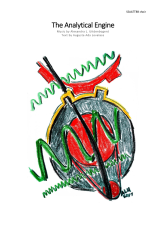My recently completed works, Songs of Fear and Aftermath were performed by ROCS on Saturday. It completes an evolution of choral writing on my part. Initially most of my choral writing was quite separate from my songwriting, with a small overlap being my non-song a cappella things, and the odd silly song (Lucky Person, arranged for choir and concert band, 2001). If I consider the 3-year intervals of the Choral Composition Competition and its predecessor, I moved from setting a contemporary poet in 2004 (Pomes, now Antipomes), to the IP mess that occurred following Pomes leading me to set long-dead poets in 2007 (Daffodils, Who’s in the Next Room?), to setting a poet friend’s poetry in 2010, since I prefer working with contemporary text where possible (Rocks), and dabbling with setting my own very short text (The Dream), to an extended composition on my own very short text in 2013 (Moments), to this year’s long work set to a substantial text of my own that is partly an evolution of my songwriting.
This work brings together various threads of my art. Songwriting is there in Naiveté Stripped and Echoes of Fear. A small amount of beautiful a cappella is there in the movement Realising Vulnerability. I’m famous for rounds, and Echoes of Fear was written for one singer with a looper originally, and therefore effectively builds up like a round. Realising Vulnerability also continues an idea I started exploring with Moments, which is the building of a phrase over multiple iterations. They are a modern and more serious take on the “cumulative song” idea (eg. Twelve Days of Christmas).
Naiveté Stripped also explores the use of vocal flexibility as substitute for instruments, with the use of “dn” for piano or acoustic guitar substitute, and “wom” and “daw” for more sustained, possibly synthetic instruments. I’ve been exploring a cappella arrangements of songs originally written with instrumental accompaniment for the last five years, with the infamous “dn” syllable first appearing in my 2012 arrangement of Still Alive.
Desiring Invisibility musically continues my work from Missa Prima, in which the rhythms are very much driven by the text, leading to varying meters throughout the verses. Like many of my works, it is modal, but I extended myself more, by incorporating modulation to “related modes” in the verses.
World Cloud draws on my research in information retrieval and computational linguistics and puts it into a field I have intended to dabble in for years, which is data sonification. It isn’t quite a true data sonification, as I made a few aesthetic decisions that weren’t completely determined algorithmically, but it’s very close. My previous pieces to be influenced by information retrieval were Plummet (2000), which used the search results of the query “plummet” from a corpus of literary works as its text, and Shazam (2011), a catch with surface text about music information retrieval.
Another thing I’m famous for is catch writing, and a small number of choristers also know of my tendency to put phrases into a part that won’t be heard by the audience, but make sense to the singers of the part. I first did this in Water Songs (2011). You’re Like Water, has the melody line sing “There’s no way I can make you stay”, while the tenors sing “There’s no way I’d stay”. Drowning, in the original SAT song cycle version, has the main melody sing “I’m drowning in an ocean of you”, while the tenors sing “I’m drowning you”. Likewise, this work has hidden messages for those who know how to look and listen.
Related to the idea of different messages being sung by different parts, is the way I constructed Desiring Invisibility in particular. I was somewhat influenced by Theodor Kipen’s game, in which those who chose male characters for the game were oblivious of the rest of the game. But it is also like a duet between two characters in an opera or musical, in which they are both expressing their own thoughts and oblivious of the other character’s. Partly due to the needs of the work, and partly a nod to the varied and ambiguous genders of modern choir tenor sections, the tenor line swaps gender here and there, in terms of which character it joins.
I have been quite driven by this work since January last year, and after completing the conducting of the entire concert repertoire in the dress rehearsal in front of the judging panel on Thursday, and knowing that the programme notes were done, I felt a sense of relief, that my work has been done. It’s out there; it’s been heard. I have no great desire to write more choral works after this, although this doesn’t mean I won’t. But I feel as though the work I was meant to write has been written. Due to the difficulty of the subject matter, it was a miracle it could be performed at all. (New composition milestone: making a singer throw up during rehearsal). It may be that only certain movements will be performed more than once. I can see Hope having a life of its own, being sung in support of the traumatised and marginalised in society. I will continue to perform Echoes of Fear occasionally on looper during gigs, and probably Naiveté Stripped when I do a gig at a keyboard, as that is how that song started. Then maybe one day someone will write a paper on the work.
A word of warning to those who believe they know what the text is referring to. It cannot be taken completely literally, as, like with my songwriting, text tends to have a life of its own, going in unexpected directions. The emotions are as true as I can write them though.


